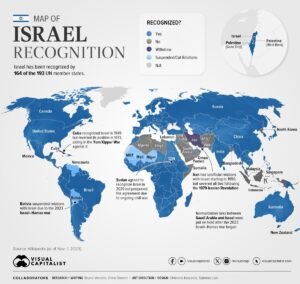Brazil has formally implemented a long-awaited free trade agreement with the Palestinian Authority, aiming to improve Palestine’s economic prospects while also promoting regional peace.
“The agreement is a concrete contribution to an economically viable Palestinian state, which can live peacefully and harmoniously with its neighbors,” Brazil’s foreign ministry said in a statement on Monday.
State of Palestine — Ministério das Relações Exteriores (www.gov.br)

Since 2010, Brasilia, the capital of Brazil, has granted recognition to the state of Palestine and permitted the opening of a Palestinian embassy. The deal between the Palestinian Authority and the Mercosur trade bloc of South America was reportedly ratified on Friday by Brazil, which permits the construction of a Palestinian embassy in the capital of Brazil and acknowledges a Palestinian state. The agreement was struck in 2011.

Ibrahim Al Zeben, the Palestinian ambassador in Brasilia, praised the agreement’s execution and called Brazil’s action brave and encouraging. He expressed hope that this will lead to a major increase in the $32 million in annual trade between Palestine and Mercosur.
Several countries have expressed support for Palestine through various means:

- Jordan: As a neighboring country, Jordan has consistently supported Palestinian rights and sovereignty. It maintains diplomatic relations with the Palestinian Authority and hosts a significant number of Palestinian refugees.
- Turkey: Turkey has been vocal in its support for Palestine. It has provided humanitarian aid, hosted conferences on Palestinian issues, and called for a two-state solution.
- Malaysia: Malaysia has consistently advocated for Palestinian rights at international forums. It supports economic development in Palestine and has condemned Israeli settlements.
- South Africa: South Africa has historical ties to the Palestinian struggle against apartheid. It supports Palestinian statehood and has called for an end to the Israeli occupation.
- Ireland: Ireland has been active in promoting peace in the region. It supports Palestinian statehood and has criticized Israeli settlements and human rights violations.
International recognition significantly impacts Palestine’s status in several ways:

- Legal Standing: Recognition by other countries establishes Palestine as a legitimate political entity. It acknowledges its right to self-determination and sovereignty. When a country recognizes Palestine, it treats it as a state with rights and responsibilities under international law.
- Diplomatic Relations: Recognition allows Palestine to engage in diplomatic relations with other nations. It can establish embassies, sign treaties, and participate in international organizations. For example, Palestine is a non-member observer state at the United Nations.
- Access to International Forums: Recognized states can participate in global forums, such as the UN General Assembly, where they can voice their concerns, advocate for their rights, and seek support from other countries.
- Economic and Humanitarian Aid: Recognition often leads to increased foreign aid, both economic and humanitarian. Recognized states can receive financial assistance, development projects, and emergency relief.
- Symbolic Importance: Recognition serves as a symbolic gesture of solidarity. It sends a message that other countries support Palestinian aspirations for statehood and peace. Symbolic recognition can also influence public opinion and raise awareness about the Palestinian cause.
India’s stance on the conflict between Israel and Palestine:

Support for the “Two-State Solution”: India is in favor of the “two-state solution,” which calls for the coexistence of Israel and Palestine in peace as a sovereign, independent, and viable state1. This position hasn’t changed over time.
Condemnation of Terrorism: India has strongly denounced terrorism and supported Israel in response to Hamas attacks. It hasn’t labeled Hamas as a terrorist organization, though.
Requirements for Diplomacy, Dialogue, and Restraint: India has made diplomatic, dialogue, and restraint demands of Israel. It has also denounced civilian deaths that occur during hostilities.
Humanitarian Aid: During the previous month, India has shipped 70 tonnes of medical supplies and medications to Gaza via Egypt.
UN Votes: India supported several draft resolutions denouncing Israel’s settlement practices in occupied regions but did not vote in favor of a UNGA resolution requesting a ceasefire.










